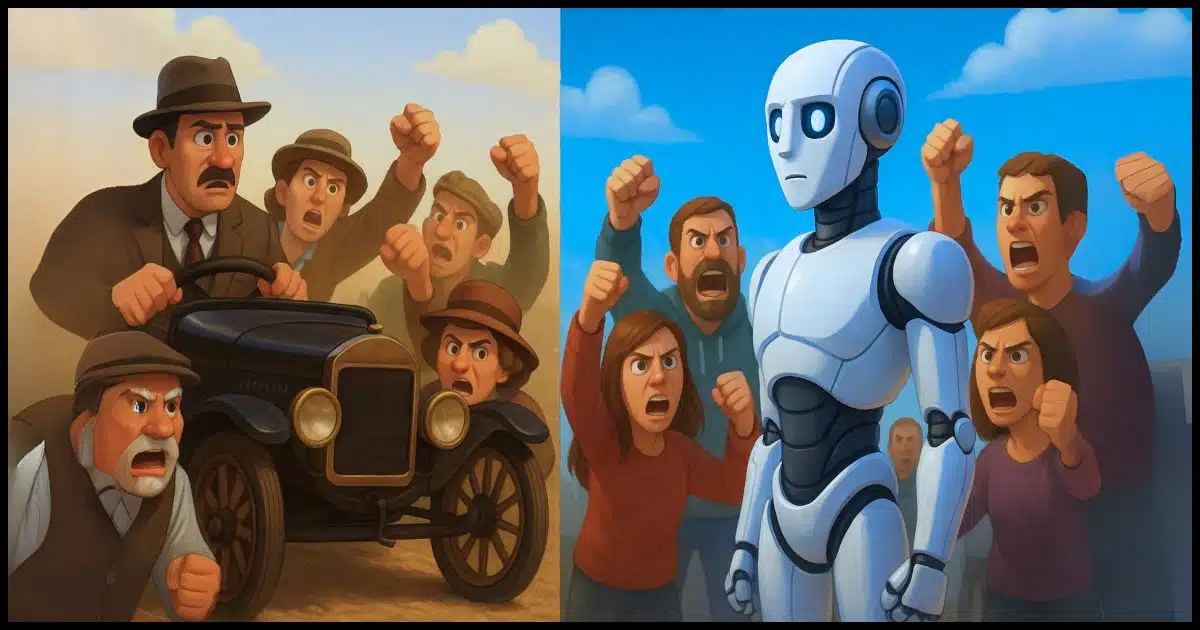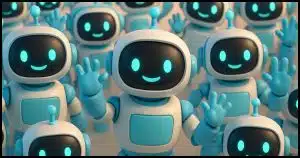We don’t. But don’t be too quick to dismiss it.

You may not like the approach I’m going to take. I’m going to draw a comparison.
Hear me out, as I start by rewriting your question.

Do we need AI?
We don’t need AI now any more than we needed cars in the 1920s. But AI is here, growing fast, and could change everything. It’ll bring problems, sure, but it could also improve life in ways we can’t yet imagine. The key? Stay curious, get informed, and help shape what comes next.
Why did we suddenly need the automobile?
I am asking about the modern “horseless carriage” that is suddenly a worldwide phenomenon that is attracting hundreds of millions of dollars of investments in huge multi-acre manufacturing plants with thousands of employees and huge power requirements that almost demands we start drilling and drilling for more oil to run them all. Why does the world suddenly need all of this?
That’s a question I’m certain was asked by many shortly after the turn of the previous century — say the 1920s. The automobile was the New Big Thing, and it was changing society forever. Many, I’m sure, were asking why we needed this newfangled contraption. We seemed to do just fine without it.
The answer to this turn-of-the-previous-century version of your question is the same as my answer to your question about AI.
We don’t.
We don’t need any of it. We could have lived without the automobile. Heck, there are plenty of folks who would say it would even be a better world if we hadn’t adopted it so thoroughly.
We could live in a world without AI.
The question we don’t yet know the answer to is: Do we want to? Would it be a “better” world?
Help keep it going by becoming a Patron.
Hindsight only happens in reverse
In hindsight, there’s a pretty powerful argument that we’d be better off with automobiles than we would be without them.
Yes, there are plenty of downsides: pollution, industrial waste, massive acres of pavement, accidents, and more. I won’t sugarcoat it. And while we’re making progress on some of these, the fact is that the automobile continues to harm society all these years later.
And yet it’s offset by massive positive effects. That we can drive anywhere at any time, and that it’s even marginally affordable, is absolutely amazing. It enables us to live a life we simply could not have imagined pre-auto. Quick trips to the grocery store1 and cross-country road trips to visit family and friends, or to take part in activities we might never even have heard of in the past2, are just the tip of the iceberg.
Expand that vision to include the increased commerce and trade, and once again, we find we’re living in a world our 1920s counterparts could not have imagined.
Much of what the automobile has enabled is so core to what we are and how we live that we take it all for granted now.
We didn’t need it, but we’re better off because of it.
Foresight is impossible
I’m not saying we’ll be better off with AI than without it. We don’t know. It’s still happening, and we don’t yet know the impact it will have.
What the world will look like in just a few years is uncertain for a variety of reasons; AI is just one of them. Will it help or hinder? Will the changes it makes and the impact it brings be net positive or negative? We just don’t know.
There are people at both ends of the spectrum who believe strongly that AI will bring salvation or doom. Back in the day, I’m certain some felt the same way about the automobile.
It’s impossible to say what the future truly holds.
My bet is on net positive
There will be downsides to AI. There already is environmental and societal impact, “accidents”, and more. Just as with the automobile, there will be some massive mistakes and spectacular failures.
The automobile, while continually being refined to this day, is an assumed staple of society and something we all now take for granted. Its massive mistakes have passed into history.
My expectation is that AI will eventually fall into this category. I don’t know what it will look like, because again, it’s too early to say. But I believe it will continue to be refined and improved upon, including actions to mitigate the negative impacts we’ve already identified.
I expect that someday, AI will be something we take for granted too.
Do we need it? No. Could our lives be better because of it? Very possibly so.
Only time will tell.
Do this
Don’t dismiss AI because you don’t understand it or don’t see a need for it. Many of the things we take for granted these days started the same way. Work to understand it as best you can. Hold its creators accountable, for sure. With our participation, AI can be molded into something we’ll consider a net positive years from now. Simply dismissing or railing against it takes that power away from you.
Subscribe to Confident Computing! Less frustration and more confidence, solutions, answers, and tips in your inbox every week.



Very interesting observation – comparing AI to the emergence (and eventual acceptance) of the automobile. I’m not yet ready to “go to bat” in promotion of AI as a positive thing, but my opinion about its value matters little, because it is already here – and usage is increasing rapidly (yes, I’m even finding ways to use it to my benefit). So – our only choice is to “deal with it” -which is, in essence, what your article said.
Far as I can tell, AI is good for gathering information on a given topic from all over the web. I don’t know whether AI does enough research to sort out accurate from inaccurate information, though. My mother saved up and bought her first car in 1933. The car salesman taught her how to drive it. https://www.matherclan.com/Ellswrth/Flora.shtml
From what I can tell, cars have not substantially improved from that first car of hers. They are more comfortable, with heat and air conditioning, etc., but still all use gas and oil. Electric cars are not yet ready for prime time since there are so few chargers around the country, and I’m still waiting for a solar car! I would hope that in 90+ years AI will be able to sort out accurate from inaccurate information, truth from propaganda.
Unfortunately, AI chat bots don’t always get their fact checking correct. I expect it to improve over time.
Cars today are MUCH safer (and fuel efficient) than that 1933 classic.
And as an owner of an electric car of one sort or another for the last 9 years, I can say with confidence that they are quite ready for prime time.
Last night I saw on South Park, they called Chat GPT “Sickofancy”. Great name. It’s something I’ve noticed; they go out of the way to smother you with flattery, I guess, to keep you engaged. I find it as annoying as he**.
As I Understand it they;re actively toning that down. I hate that it also restates my question most of the time before answering. AND that the answers are all longer than needed. All of this can be controlled by asking the question the right way, but still….
Maybe we should add a line at the end of the question, “Hold the BS please!”
In addition to the issues cited above, there is the way the AI (I’m thinking principally of ChatGPT as I write this, but they ALL do it to some extent or another) always, Always, ALWAYS, ends by irritating me with asking you “Shall I (or, “Would you like me to,” etc.) follow up by” doing thus-and-such.
I understand it’s just trying to be “helpful,” but if I wanted any additional information, I could always ask for it myself. As it stands, it feels as though it is constantly trying to “push itself onto” me.
You can carefully craft your prompt to tell it not to. In some, like ChatGPT, you can also craft “standard” information that becomes its basis of knowing you, or is included in every prompt. What I’m finding is that over time it’s learning my preferences, so maybe tell it “don’t ask for followups” enough times and it’ll stop.
They are looking to increase engagement. I just ignore them. I think I clicked on one of those links once. One useful skill on the web is resisting clickbait. 😉
For what it’s worth, I think AI is fascinating and could be helpful and productive in so many ways. I use it a little to do genealogy–with caution. At the same time, I believe its potential misuse could result in enormous negative outcomes, well beyond the analogy with a car. There is little regulation of it in the U.S. and we are seeing some scathing uses of it in media, social media, writing, music, and so on. One can not trust what’s in front of one’s eyes these days. What to believe? How to vet?
“How to vet?”
Maybe get one AI to vet another…?
I’ve done that and found they often give the same results because they all use the same Internet. I’ve even got some nearly word-for-word results from different chat bots.
I’ve been predicting Google as the frontrunner in AI. Google is arguably the benchmark for search engines, having pioneered web search since its founding in 1998. With over 25 years of experience, it has outlasted and outperformed many competitors. Google holds one of the most extensive repositories of indexed web content and possesses the advanced technology to interpret and organize that information, making it a powerhouse in both search and AI innovation.
Grok is arguably the least accurate AI Chatbot, but I’ve found it to be excellent for one thing – creating political cartoons. All the other Chatbots I’ve tried have policies against that, but Grok has no such policy.
I have a concern about AI but it is not exactly about AI but the effects of it on jobs. We did a lousy ‘job’ of handling the changing economy from the 1950’s manufacturing sector to the 1980’s service sector that we have now. Many people were left unemployed, societal values did not readily adapt to that change and our educational system remains sorely inadequate to produce workers for the service sector & IT jobs. I worked with many people younger than me who struggled with basic reading, writing and PC skills.
In the early 2000s the last couple of mills in this area closed. The insurance company I worked for held a job fair for 200 of these people. My boss told me they were able to hire 4 of them because the others lacked the requisite high school math, reading and basic PC skills.
What will happen to these people as AI reduces the number of lower skill jobs? I’m pessimistic.